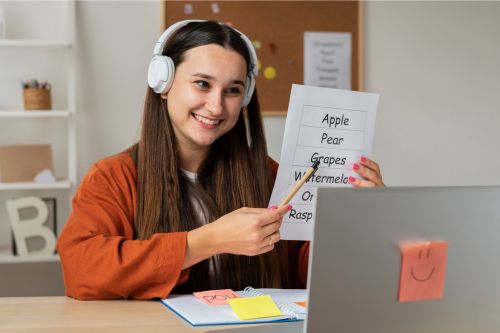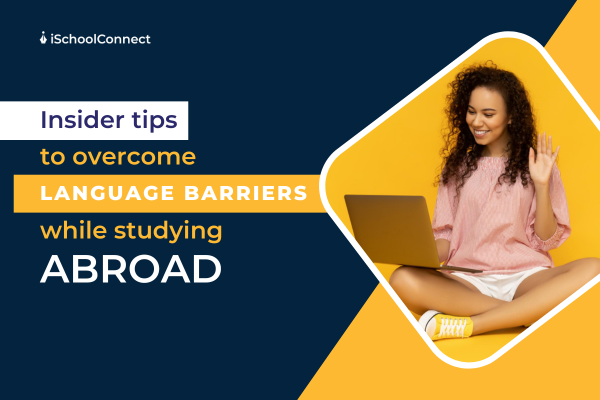Table of Contents
- Overcoming language barriers | Introduction
- Understanding the basics
- Engage in language exchange
- Take a language course
- Immerse yourself in the local culture
- Be patient and persistent
- Use non-verbal communication
- Keep a language journal
- Set language goals
- Watch local TV shows and listen to music
- Leverage language learning apps and tools
- Key takeaways
- FAQs
Overcoming language barriers | Introduction
Embarking on your study abroad adventure? Amazing! This journey offers enriching experiences and provides transformative learning opportunities. However, many international students face the language barrier.
But don’t sweat it, you can definitely overcome this challenge. Consider this blog post as your personal roadmap to breaking down those barriers. Let’s get started!
Understanding the basics
Imagine playing a new video game. You’d want to get the hang of the controls first, right? The same goes for a foreign language. Try getting a grip on the language basics before leaving your home. Free apps (like Duolingo), online lessons, and textbooks are your training ground. Understand common phrases, greetings, numbers, and you’ll be in control when you land.
Engage in language exchange
Language exchange is the secret to overcoming language barriers. Picture this, you team up with someone from your host country who wants to improve their English while helping you learn their language. This not only allows you to improve your language skills, but it also helps you forge meaningful friendships. By immersing yourself in this way, you’ll gain insider insights into the local culture. Plus, you’ll discover awesome study groups to join, so it’s a win-win!
Take a language course

Most foreign universities offer language courses for international students. Enrolling in these courses can boost your language proficiency remarkably. These classes are designed to accommodate different proficiency levels and often incorporate aspects of local culture, making language learning a more engaging and enjoyable experience.
Immerse yourself in the local culture
Language is more than just words and grammar, it’s closely tied to culture. Engaging with the local culture can therefore provide context and facilitate language learning. Attend local events, explore local attractions, and try local cuisines. The more you expose yourself to daily life, the easier breaking the language barrier will become.
Be patient and persistent
Hang in there and keep going! learning a language takes time and effort. It’s not an overnight transformation, so be patient and persistent. Don’t let moments of embarrassment or frustration discourage you. Keep a positive mindset and remember that even native speakers stumble and make mistakes. Every stumble is actually a step closer to fluency. To give you a boost, here are a few language barrier examples you might encounter-
- Mispronouncing words.
- Struggling to understand local accents.
- Having difficulties expressing yourself accurately.
Embrace these challenges, stay determined, and before you know it, you’ll be soaring through these barriers with confidence!
Use non-verbal communication

Non-verbal communication can often bridge gaps where words fail. Gestures, facial expressions, and body language can help you express yourself better. However, be aware of cultural differences, some gestures may have different interpretations in different cultures.
Keep a language journal
Keeping a language journal can help reinforce what you’ve learned. Jot down new vocabulary, phrases, or interesting language patterns you encounter. Reflecting on and revisiting these notes will accelerate your language learning journey.
Set language goals
Crushing the barrier is no small feat, but you’ve got this! Start by setting some language goals that are both realistic and specific. Whether it’s mastering five new words daily or confidently ordering food in the local language, having a clear focus will fuel your determination. Remember, a language barrier is also known as a communication roadblock, but with the right strategies, such as this one, you can break free.
Embrace this exciting journey, take it step by step, and witness those pesky barriers crumble before your eyes. You’ve got the power!
Watch local TV shows and listen to music
Immersion can also be a form of entertainment. Watching local TV shows, and films, and listening to local music can help you understand the usage of the language and accent. Plus, it’s fun, and you’ll understand cultural nuances along the way.
Leverage language learning apps and tools
In today’s digital age, a plethora of innovative tools and apps are available at your fingertips. Google Translate comes to the rescue for instant translations, while language-learning platforms like Rosetta Stone and Memrise offer interactive lessons. These resources serve as valuable supplements to your language learning journey, but remember, they work best when combined with other strategies. Immerse yourself in the language through cultural experiences, connect with locals, and embrace the vibrancy of events.
Practice makes man perfect, So you should work hard and try to speak with confidence. You will be able to overcome those language barriers in no time.
Key takeaways
- Set specific and achievable language learning goals to stay focused and motivated throughout your study abroad journey. Whether it’s learning new words daily or improving conversational skills, having a target will guide your progress.
- Immerse yourself in the local culture by watching local TV shows, and films, and listening to music in the target language. This exposure will help you grasp the language, accents, and cultural nuances, enhancing your language-learning experience.
- Seek out language exchange opportunities with native speakers. Engaging in language exchanges not only allows you to practice your target language but also opens doors to forming new friendships, gaining cultural insights, and finding study groups.
- Take advantage of language learning apps and online resources to supplement your studies. These tools can provide interactive lessons, translation assistance, and opportunities for practice, making your language learning more engaging and effective.
Ready for an even better study abroad experience? Explore our articles for expert advice on overseas education and study abroad programs. Contact us now to start your academic adventure today!
Liked this blog? Read next: Top 10 creative arts courses you can pursue
FAQs
Q1: Are there any online communities or forums for language learners?
Ans: Yes, there are several online communities and forums dedicated to language learning. Websites like Fluent in 3 Months, Language Learning Stack Exchange, and language-specific subreddits on Reddit offer platforms for language learners to connect, ask questions, share resources, and seek advice from others who are on a similar language learning journey.
Q2: How long does it typically take to overcome language barriers while studying abroad?
Ans: With consistent effort and practice, you can make significant progress within a few months to a year. However, fluency may take several years of continued learning and practice.
Q3: Can I take language courses alongside my regular academic program?
Ans: Yes, many universities abroad offer language courses specifically designed for international students. Often, these courses are structured to accommodate everyone, from beginners to advanced learners. You can usually take these language courses alongside your regular academic program, allowing you to improve your language skills while pursuing your chosen field of study.






